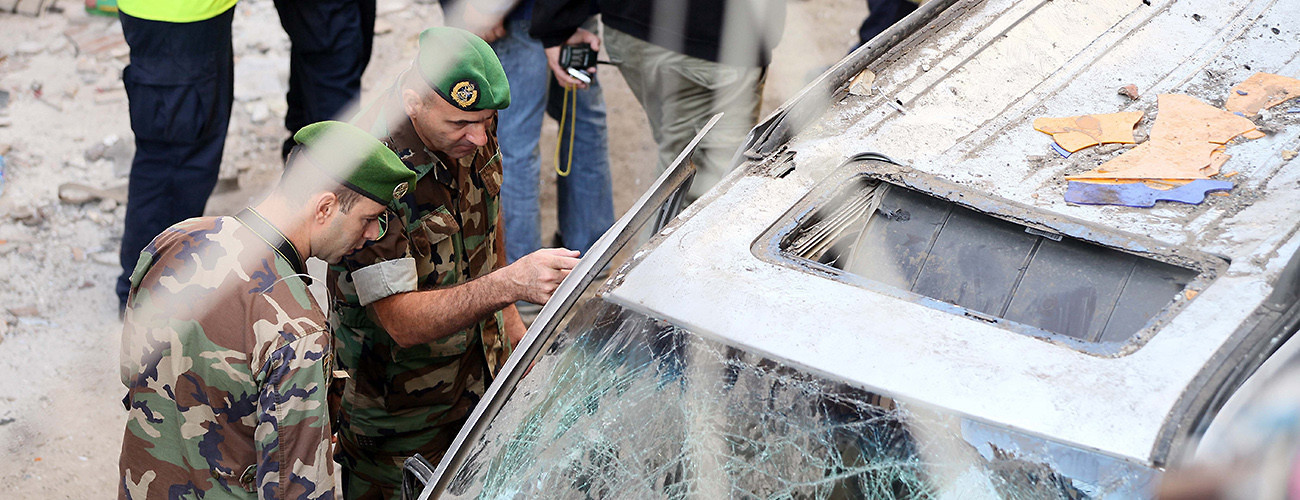Lebanese soldiers inspect the site of ISIS-claimed attacks within the Hezbollah stronghold of Bourj el-Barajneh. Beirut, Lebanon, November 13, 2015. (Ratib Al Safadi/Anadolu Agency/Getty Images)
A month has now passed since two suicide bombers detonated explosives in the southern Beirut suburb of Bourj el-Barajneh, killing as many as 40 people. The bombings, immediately claimed by the so-called Islamic State (ISIS), were the deadliest terrorist attacks in Beirut since the end of the Lebanese Civil War.
In light of the violence in Paris that followed a day later, the lack of global media and political attention paid to the Beirut bombings became a topic of considerable criticism. While the Western-centrism this displayed is problematic in its own right, a closer look at the attacks and the subsequent response could have also offered valuable insights into Beirut and Lebanon’s security sector, as well as the political relationships that shape it. These in turn have wider policy implications relating to unstable countries.
To many outsiders, a notable development in the aftermath of the November 12th violence would have been that, rather than agencies of the state, the first on-the-ground response came from a parallel authority, in the form of the Shia militia and political movement Hezbollah. The group, which has a large presence in Beirut’s southern suburbs, quickly launched a manhunt for the bombers, which resulted in the killing of at least one suspected assailant.
That Hezbollah mounted this response was not unexpected in context. It reflects the relatively limited role the Lebanese state plays in providing security—even within its territory. This authority is instead exerted and taken up by a multitude of actors, often motivated by political or sectarian competition and with varying degrees of authority and legitimacy.
This phenomenon, best described as “plural security,” has a number of manifestations: Many political parties, most of which are linked to particular religious communities, have organized security apparatuses; self-appointed neighborhood committees patrol sectarian territories; and private security companies are visible throughout the city. Operating concurrently, and at times in collaboration with these actors, are the national and municipal police, the Lebanese Armed Forces (LAF), and state intelligence services. The Bourj el-Barajneh attacks help illustrate three additional characteristics of the Lebanese security panorama: the intricacy of its networks, the overwhelming focus on the de-escalation of conflict, and the links that exist between geopolitics and the street.
Lebanon’s security providers are connected through a web of overlapping arrangements, in which the boundaries between public and private identities of agents blur: A policeman may be a party operative; a politician’s personal entourage may barricade a public street. The interconnections between these actors enable communication and negotiation around the practical agreements necessary to maintain local security and order. Though confusing to outsiders, the arrangements provide the primary—though not always responsive—system of recourse for citizens facing perceived threats or injustices.
Political parties in turn act as coordinating hubs for these networks, operating through community representatives and informants. Party members or representatives are almost always the first to respond to incidents with a political or sectarian dimension. After November’s attacks, for example, police and LAF personnel arrived on the scene after Hezbollah, and most likely with its clearance.
Highly localized and discrete arrangements to keep the peace are often pursued through mediation, which is typically overseen by community or religious leaders. Higher-level party members or state forces only interfere if and when circumstances threaten repercussions beyond the neighborhood in question. In this way, security in Beirut’s communities is neither perceived to be, nor provided as a public good. It is arguably governed and activated according to the interests of political parties, rather than citizens.
As such, stability in the city’s neighborhoods often rests on a tenuous settlement among domestic political parties. When national or international political tensions rise, they are soon felt on the streets. The November 12th bombings underscore this multi-level nature of providing security in Beirut. Bourj el-Barajneh was a soft-target strike against Hezbollah and its constituents.
Violence aimed at a particular neighborhood can also send shockwaves through the national political arena. Days after the Beirut bombings, Hezbollah Secretary-General Sayyid Hassan Nasrallah urged parties to work toward a political settlement to the country’s internal disputes, building on the current climate of solidarity. It would appear that these words were taken up in Hezbollah’s tacit acceptance of the presidential candidacy of Marada Movement leader Sleiman Franjieh, a move which may help break the deadlock sustaining Lebanon’s 18-month leadership vacuum. Hezbollah’s role in protecting its neighborhoods has weighed heavily on the party; its resources are stretched between fighting a war in Syria, maintaining its vigilance against Israel, and performing its role in government. This enduring strain has likely strengthened the appeal of pursuing political consensus and stability.
Beirut provides a distinct example of how plural security is linked to broader patterns of political competition and governance. In the face of a mounting threat from groups like ISIS, any efforts to support or reform security in the city, and Lebanon more broadly, will need to take this into account. Plural security is in fact the norm in countries challenged by conflict and fragility, yet there remain few practical options for the international community to engage with the reality, making further investigation necessary. The reality is often that the provision of local security is held hostage to powerful interests and (geo)political maneuvering. This demands more innovative thinking on how to direct such arrangements toward better serving citizens and delivering security as a public good.
Megan Price is a Research Fellow at Clingendael. Michael James Warren is a Programme Manager at PAX.





